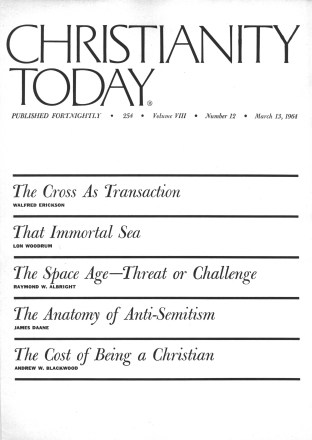If sixteenth-century man was disturbed by a deep sense of guilt, twentieth-century man is also disturbed by a debilitating sense of defeat. Whereas Luther saw human existence as needing forgiveness, a modern German theologian sees it as requiring courage. Doubtless modern man understands Tillich’s observation at least as well as he does Luther’s, for his life is haunted by defeat, and he regards himself more the victim of life than the bearer of it.
How can the Cross be presented as helpful to a generation victimized by dark powers within and by massive, uncontrollable historical forces without? Is not the Cross itself a symbol of defeat? Surely a figure nailed to suffering and death is not a symbol of victory. Is not the Cross a symbol of man’s problem, rather than a symbol of its solution?
Too often Christians have presented Christ crucified as though he were a victim, one more to be pitied than believed in. On the pages of Scripture nothing sanctions this view of Christ. In death no less than in life he is always the Lord. It was not a victim but the Lord who died. The Cross bespeaks a sacrificial death, a voluntary act. Christ’s death was self-chosen; it was accepted and has therefore the character and value of a sacrifice.
Jesus himself determined the fact of his death. He said it forcibly: “I lay down my life.… No man taketh it from me.… I have power to lay it down, and I have power to take it again.” He himself poured out his own life in death; he gave his life, and thus it was a sacrificial ransom for many.
While nothing in the biblical record suggests that Christ was a victim, many things in its story reveal that his destiny was not really in the hands of his enemies but in his own.
Jesus determined also the time of his death. Those who took counsel to put him to death decided that it must not occur during the Passover, lest it precipitate a riot. But Jesus had set his date and would keep it. He himself stirred up the people to high-pitched messianic expectations by raising Lazarus from the dead, by requisitioning a donkey with no permission asked; and intentionally fulfilling Old Testament prophecy, he himself provided the acclaiming crowd of Palm Sunday. He prompted Judas to act “quickly”—and the chief priests, having their man suddenly thrust upon them, had to use him at once or not at all. Christ determined that on the day the traditional paschal lamb was chosen, the Lamb of God would also be chosen. By Jesus’ own plan he was chosen on Thursday and died on Friday.
Nor was Jesus the victim of Judas. Jesus himself announced that he would be betrayed by one of the twelve. He did not expose Judas but prompted Judas to expose himself. Compelled to follow suit when the betrayal was suddenly announced, Judas too had to ask, “Lord, is it I?” And Jesus answered, “You yourself have said.”
Confronted in Gethsemane by an armed mob, he again dramatically revealed that he was no helpless victim caught in a web of circumstance. He spoke, and the mob reeled backward in impotence.
On the Cross, he remained the Lord, Lord of the Cross itself and of the hatred that fixed him to it: “Father, forgive them.” From the throne of his Cross he commanded, “Woman, behold thy son!” And to John, “Behold thy mother!”
Even in the jaws of death, he remained Lord. All death and hell could not reduce him to a passive victim. He remained the acting Subject. Strange paradox, in his very dying he was functioning as Lord, pouring out his own life. He remained in command of his anguish, rejecting the preferred intoxicant that in full consciousness he might truly give himself sacrificially in an act of love.
How strangely he died! Death did not come to him; he went to death. At the time he willed, he with a strong, “loud voice” himself committed his spirit into the hands of God. His death was his own; in dying he was still in command.
How else could the Lord die but in this royal manner in which death itself became the victim, and the Resurrection was assured? Small wonder he arose—it was already disclosed on the Cross that he would. Let the Church again proclaim the Cross as the Lord’s self-chosen place and time and manner of death. It will then become again a symbol of triumph, and men will lift up the Cross with courage and declare once more: In This Sign We Conquer.










